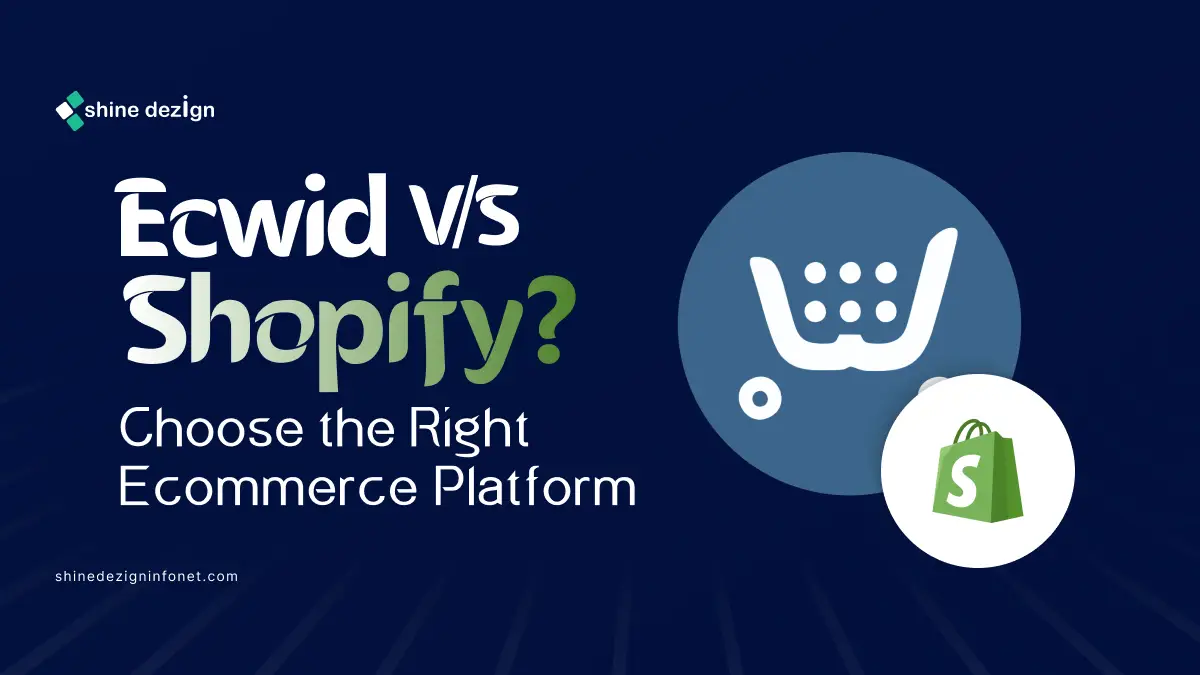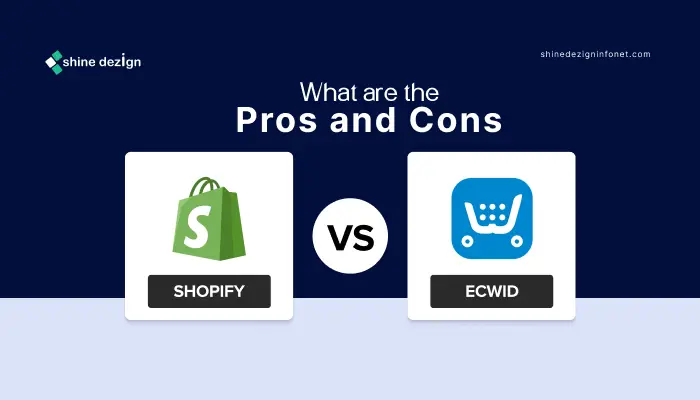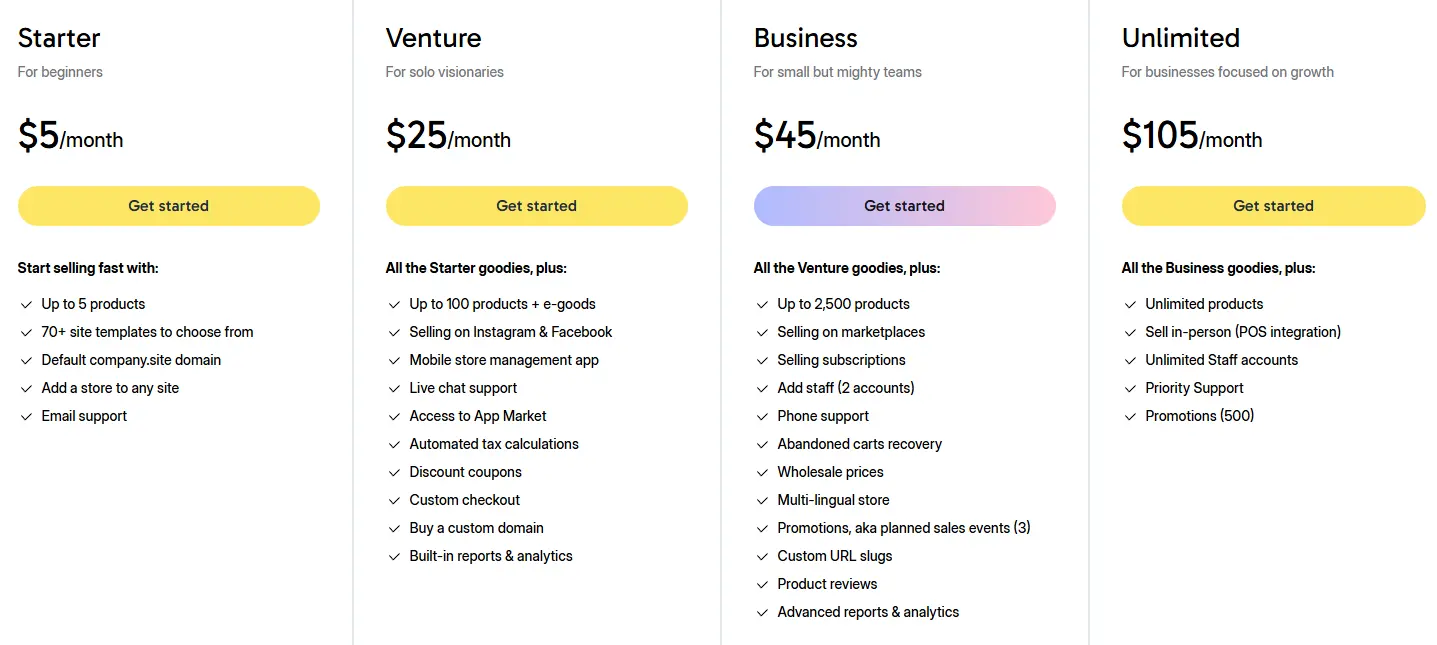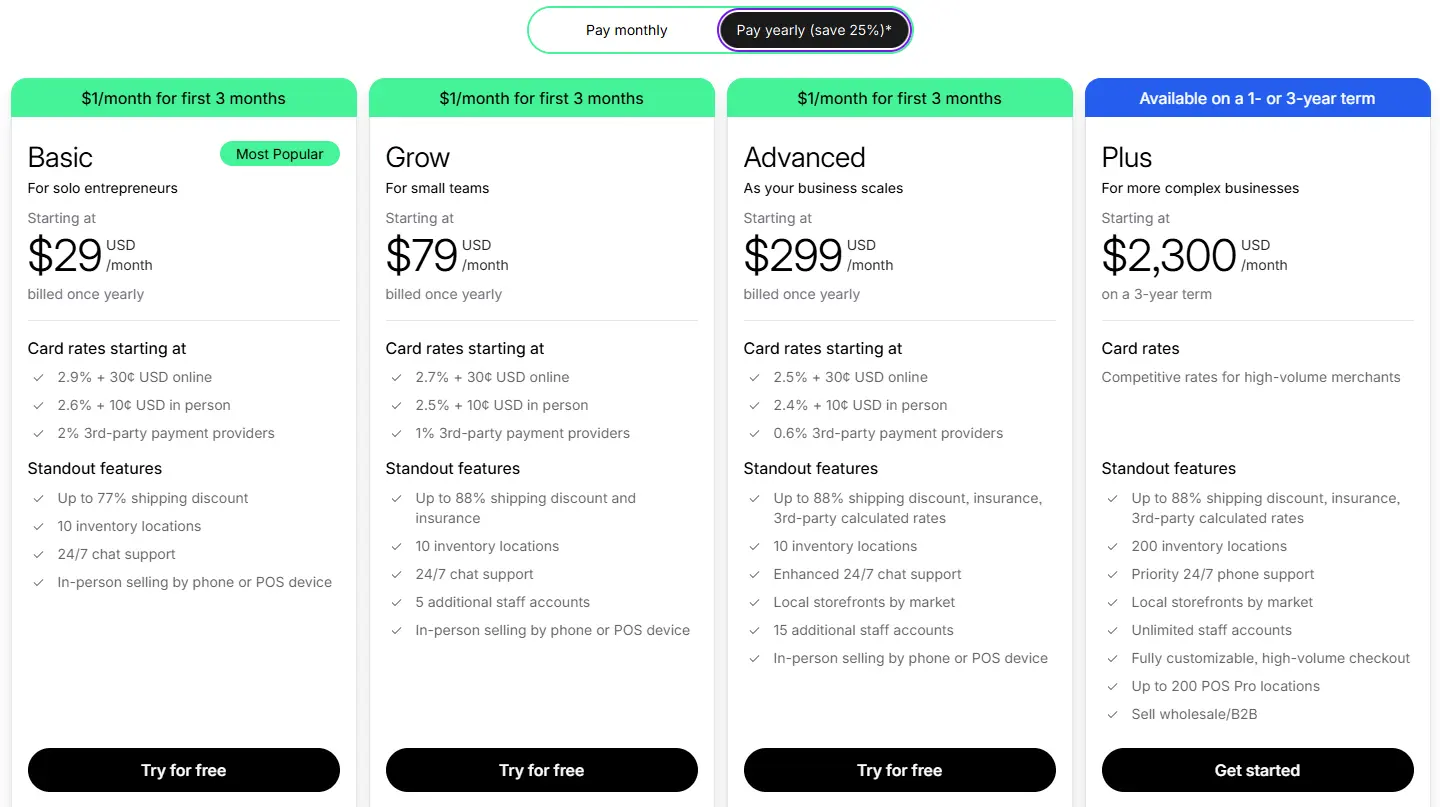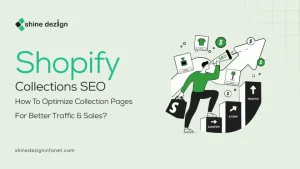Table of Contents
- Introduction
- About Ecwid
- What are the Key Features of Ecwid?
- About Shopify
- What are the Key Features of Shopify?
- What are the Pros and Cons – Ecwid Vs Shopify?
- What are the pricing differences – Ecwid Vs Shopify?
- Comparison Table – Ecwid Vs Shopify
- What to Choose and When? Ecwid vs Shopify
- Summing Up: Ecwid Vs Shopify
Choosing the right e-commerce platform is crucial for success. Ecwid and Shopify are two leading options, each serving different needs. Shopify offers comprehensive features for building a robust online store, while Ecwid allows easy integration into existing websites, making it ideal for small businesses.
In this blog, we will compare their key features, pros and cons, and pricing with a comparison table of Ecwid vs. Shopify to help you determine which platform best fits your business goals.
About Ecwid
Ecwid is a versatile e-commerce platform that enables businesses to sell products online seamlessly. It is designed for users at any stage of their business journey, allowing them to add a store to any existing website or build a new one from scratch. With customizable themes and content blocks, Ecwid simplifies the process of setting up payments and shipping, making it easy for users to start processing orders quickly. The platform is trusted by businesses in over 175 countries, providing a comprehensive solution that covers everything from inventory management to customer engagement, all while ensuring that users can focus on growing their business.
What are the Key Features of Ecwid?
The key features of Ecwid are: –
E-commerce Integration:
Ecwid allows users to add a store to any website or create a new one, providing customizable themes and content blocks for a tailored shopping experience.
Sales and Marketing Tools:
The platform offers various promotional tools, including automated ads and personalized email campaigns, to attract new customers and encourage repeat business.
Centralized Management:
Users can manage inventory, orders, and pricing from a single platform, ensuring streamlined operations and better control over their business.
Automated Marketing:
Ecwid automates marketing efforts with features like email campaigns triggered by customer actions, scheduled discounts, and AI-generated product ads.
Store Management Automation:
The platform simplifies store management with features such as domain name registration, SSL certificates, automatic tax calculations, and payment processing.
Shipping Automation:
Ecwid automates shipping costs, label generation, inventory updates, and real-time tracking, allowing users to focus on sales rather than logistics.
Comprehensive Support:
Ecwid provides robust customer support through live chat, email, and phone, ensuring that users receive assistance whenever needed.
Built-in Analytics:
The platform includes built-in e-commerce reports that help users measure customer behaviour, marketing efforts, and cash flow, enabling informed business decisions.
Overall, Ecwid is a powerful e-commerce solution that caters to a wide range of business needs, making it an excellent choice for anyone looking to sell online effectively.
About Shopify
Shopify is a leading e-commerce platform that empowers businesses of all sizes to create and manage their online stores with ease. It offers a user-friendly interface and a wide range of features designed to simplify the online selling process. Whether you are a small entrepreneur or a large enterprise, Shopify provides the tools necessary to build a successful online presence. With its robust capabilities, businesses can effectively reach their target audience, manage their inventory, and streamline their operations, making it a popular choice for those looking to thrive in the digital marketplace.
What are the Key Features of Shopify?
The key features of Shopify are: –
Store Creation and Customization:
Shopify allows users to design their online storefronts using a variety of themes and an intuitive store editor. This flexibility enables businesses to create a unique shopping experience that reflects their brand identity.
Sales Channels:
The platform supports multichannel selling, allowing businesses to sell products online and in person through Point of Sale (POS) systems. This feature facilitates sales across social media and other platforms, expanding the reach of the business.
Marketing Tools:
Shopify provides integrated marketing tools that help businesses effectively reach and retain customers. With social media integrations and Shopify Email, users can engage with their audience and drive sales.
Analytics and Management:
Users can track sales, orders, and overall performance through a centralized admin dashboard. Shopify offers inventory and order management features that streamline operations, making it easier for businesses to keep track of their products.
Developer Support:
For developers, Shopify offers extensive support through APIs and tools that facilitate the creation of custom apps and themes. The innovative Shopify Magic, an AI tool, helps generate product content and insights.
Global Selling:
Shopify simplifies international selling with features like Shopify Shipping, enabling businesses to manage global sales and create localized experiences for different markets.
Mobile Management:
The full-featured mobile app allows users to manage their stores on the go, ensuring that business owners can stay connected and responsive to their customers at all times.
Overall, Shopify provides a comprehensive and flexible solution for entrepreneurs and businesses looking to establish and grow their online presence effectively.
What are the Pros and Cons – Ecwid Vs Shopify?
 Ecwid
Ecwid
Pros:
• Easy Integration: Ecwid can be easily added to existing websites, allowing users to start selling without needing to build a new site from scratch.
• Free Plan Available: Ecwid offers a free plan with basic features, making it accessible for small businesses or those just starting out.
• Flexible Pricing: The platform provides various pricing tiers, allowing users to choose a plan that fits their budget and needs.
• Automated Marketing Tools: Ecwid includes automated marketing features that help users engage with customers and drive sales without extensive manual effort.
• Global Reach: Ecwid supports multiple languages and currencies, making it suitable for businesses looking to sell internationally.
Cons:
• Limited Customization Options: While Ecwid is easy to set up, it may not offer the same level of customization as Shopify, which could be a drawback for users seeking a unique store design.
• Fewer Built-in Features: Compared to Shopify, Ecwid may have fewer built-in features, requiring users to rely on third-party apps for certain functionalities.
• Support Limitations: While Ecwid offers customer support, some users report that response times can be slower compared to Shopify’s 24/7 support.
Shopify
Pros:
• User-Friendly Interface: Shopify offers an intuitive and easy-to-navigate interface, making it accessible for users with varying levels of technical expertise.
• Extensive App Ecosystem: The platform has a vast app store with numerous integrations that enhance functionality, allowing users to customize their stores to meet specific needs.
• Robust Features: Shopify provides a comprehensive set of features, including advanced inventory management, marketing tools, and analytics, which cater to businesses of all sizes.
• Multichannel Selling: Users can sell across various platforms, including social media, online marketplaces, and in-person through POS systems.
• 24/7 Customer Support: Shopify offers round-the-clock customer support through various channels, ensuring users can get help whenever needed.
Cons:
• Monthly Fees: Shopify operates on a subscription model, which can become costly, especially for small businesses or startups.
• Transaction Fees: Unless users opt for Shopify Payments, they incur transaction fees on sales, which can add up over time.
• Limited Customization on Lower Plans: Some advanced features and customization options are only available on higher-tier plans, which may not be feasible for all users.
What are the pricing differences – Ecwid Vs Shopify?
Ecwid Pricing
| Ecwid Plan | Pricing |
|---|---|
| Starter | $5/month |
| Venture | $25/month |
| Business | $45/month |
| Unlimited | $105/month |
Shopify Pricing
| Shopify Plan | Pricing |
|---|---|
| Basic | $29/month |
| Grow | $79/month |
| Advanced | $299/month |
| Plus | $2300/month |
 Comparison Table – Ecwid Vs Shopify
Comparison Table – Ecwid Vs Shopify
| Features/Aspects | Shopify | Ecwid |
|---|---|---|
| User Interface | User-friendly and intuitive | Easy to integrate into existing websites |
| Pricing | Monthly subscription fees | Free plan available; flexible pricing tiers |
| Customization | Extensive customization options | Limited customization compared to Shopify |
| Features | Comprehensive features for all business sizes | Fewer built-in features; relies on third-party apps |
| Multichannel Selling | Supports selling on multiple platforms | Can be added to existing sites for multichannel selling |
| Marketing Tools | Robust marketing tools | Automated marketing features |
| Customer Support | 24/7 customer support | Support is available, but response times may vary |
| Transaction Fees | Fees apply unless using Shopify Payments | No transaction fees on sales |
| Global Reach | Supports international sales | Supports multiple languages and currencies |
| App Ecosystem | An extensive app store for additional features | Limited app integrations compared to Shopify |
What to Choose and When? Ecwid vs Shopify
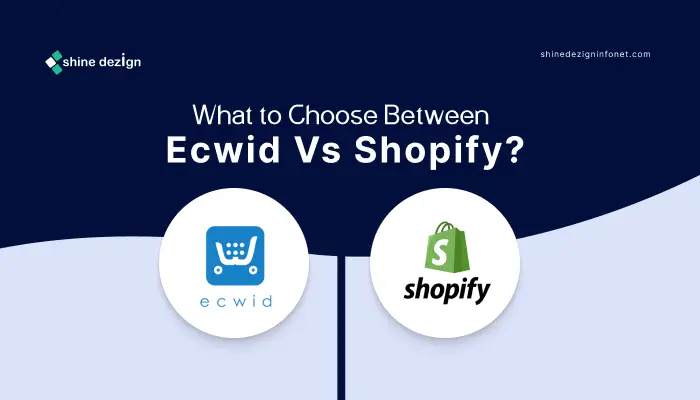 Choosing between Ecwid and Shopify depends on your specific business needs, goals, and resources. Here are some considerations to help you decide which platform may be the best fit for you:
Choosing between Ecwid and Shopify depends on your specific business needs, goals, and resources. Here are some considerations to help you decide which platform may be the best fit for you:
Choose Ecwid If:
You Want to Add E-commerce to an Existing Website:
If you already have a website and want to integrate e-commerce functionality without starting from scratch, Ecwid allows you to easily add a store to your existing site.
You Are a Small Business or Startup:
Ecwid offers a free plan and flexible pricing options, making it a cost-effective choice for small businesses or entrepreneurs just starting out.
You Want Extensive Customization Options:
Shopify provides a high level of customization through its themes and app ecosystem, allowing you to create a unique online store that reflects your brand identity.
You Prefer Simplicity and Ease of Use:
If you want a straightforward setup process without extensive technical knowledge, Ecwid’s user-friendly interface makes it easy to get started quickly.
You Need Automated Marketing Tools:
Ecwid includes automated marketing features that can help you engage with customers and drive sales without requiring extensive manual effort.
You Want to Test E-commerce Without Commitment:
The free plan offered by Ecwid allows you to test the platform and its features without any financial commitment, making it a low-risk option for new sellers.
Choose Shopify If:
You Need a Comprehensive E-commerce Solution:
Shopify offers a wide range of built-in features, including advanced inventory management, marketing tools, and analytics, making it suitable for businesses that require a robust e-commerce platform.
You Plan to Scale Your Business:
If you anticipate significant growth and need a platform that can handle increased traffic and sales, Shopify is designed to support larger businesses and can easily scale with your needs.
You Want Extensive Customization Options:
Shopify provides a high level of customization through its themes and app ecosystem, allowing you to create a unique online store that reflects your brand identity.
You Prefer 24/7 Customer Support:
If having access to round-the-clock customer support is important to you, Shopify’s 24/7 support can be a significant advantage.
You Want to Sell Across Multiple Channels:
Shopify excels in multichannel selling, allowing you to sell on various platforms, including social media, online marketplaces, and in-person through POS systems.
Summing Up: Ecwid Vs Shopify
In summary, both Ecwid and Shopify offer unique advantages tailored to different types of businesses. Considering Ecwid vs. Shopify, Ecwid is an excellent choice for small businesses or entrepreneurs who want to integrate e-commerce into an existing website without the need for extensive setup. Its flexible pricing and automated marketing tools make it accessible for those just starting out.
On the other hand, Shopify is a robust e-commerce platform ideal for those seeking a comprehensive solution with extensive features, customization options, and strong customer support. It is particularly well-suited for larger businesses or those looking to scale quickly. Ultimately, the best choice depends on your specific business needs, budget, and growth plans.


